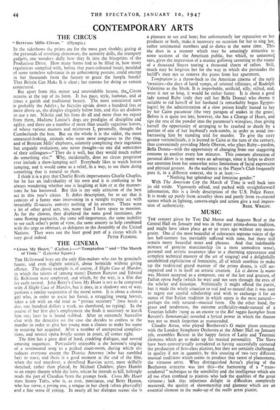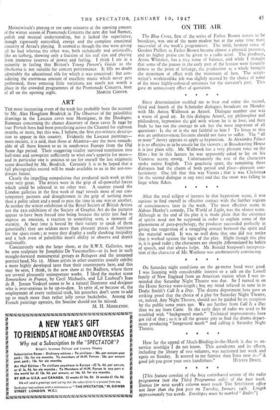MUSIC
THE concert given by Toti Dal Monte and Augusto Beuf at the Central Hall on January 2nd was in the pure prima-donna tradition, and might have taken place 40 or so years ago without any incon- gruity. One of the most beautiful of coloratura soprano voices of the last half-century has inevitably suffered with time, but there still remain many beautiful notes and phrases. And that indefinable mixture of genuine musicianship (in a most unanodern sense), personal and artistic assurance (due to a charming appearance and complete technical mastery of the art of singing) and a delightfully uninhibited exploitation of femininity, all of which combine to make up the traditional grand manner of the prima donna, is still un- impaired and is in itself an artistic creation. La ci darem la mono was Mozart accepted as. a composer, one of the last and greatest, of Italian opera buffa (which he was) and not seen through the eyes of the scholar and historian. Stylistically it might offend the purist, but it made the whole situation so real and so natural that it was easy to regret our careful scholarship and wish to exchange it for an ounce of that Italian tradition in which opera is the most natural— perhaps the only natural—musical form. On the other hand, the grace and tenderness, the extreme artificiality-made-natural of a Venetian lullaby (sung as an encore to the Bel raggio lusingher from Rossini's Semiramide) revealed a lyrical power in which the theatre was not so much forgotten as transcended.
Claudio Arrau, who played Beethoven's G major piano concerto with the London Symphony Orchestra at the Albert Hall on January 5th, resembles Busoni in the happy fusion of Latin and Teutonic elements which go to make up his musical personality. The- Slays have been conventionally considered as having successfully cornered the production of first-class pianists, but they are certainly challenged, in quality if not in quantity, by this crossing of two verydifferent musical traditions which seems to produce that rarest of phenomena, the virtuoso artist. What distinguished Arrau's playing of the Beethoven concerto was just this—the harnessing of a " trans- cendental " technique to the sensibility and the intelligence which are all too often confined to pianists who lack the qualities of the great virtuoso ; lack that infectious delight in difficulties completely mastered, the quality of showmanship and glamour which are an essential element in the make-up of the really great pianist. Moiseiwitsch's playing of the same concerto at the opening concert of the winter season of Promenade Concerts the next day had fluency, polish and musical understanding, but it lacked the superlative, though rigorously controlled, energy and the complete emotional sincerity of Arrau's playing. It seemed as though the one were giving all he had whereas the other was, both technically and artistically, like an iceberg, showing only a fraction of his real size and playing from immense reserves of power and feeling. I think I am in a minority in feeling that Britten's Young Person's Guide to the Orchestra is not suitable for concert performance. It fills no doubt admirably the educational role for which it was conceived : but con- sidering the enormous amount of excellent music which never gets performed, these amusing little variations are surely not worth a place in the crowded programmes of the Promenade Concerts, least



































 Previous page
Previous page